Knowledge Management in Ministry of Education, Oman
VerifiedAdded on 2022/12/03
|11
|4282
|246
AI Summary
This report discusses the issues and challenges faced by the Ministry of Education in Oman in terms of knowledge management. It also provides a literature review on knowledge management systems and offers analysis and recommendations for improvement.
Contribute Materials
Your contribution can guide someone’s learning journey. Share your
documents today.
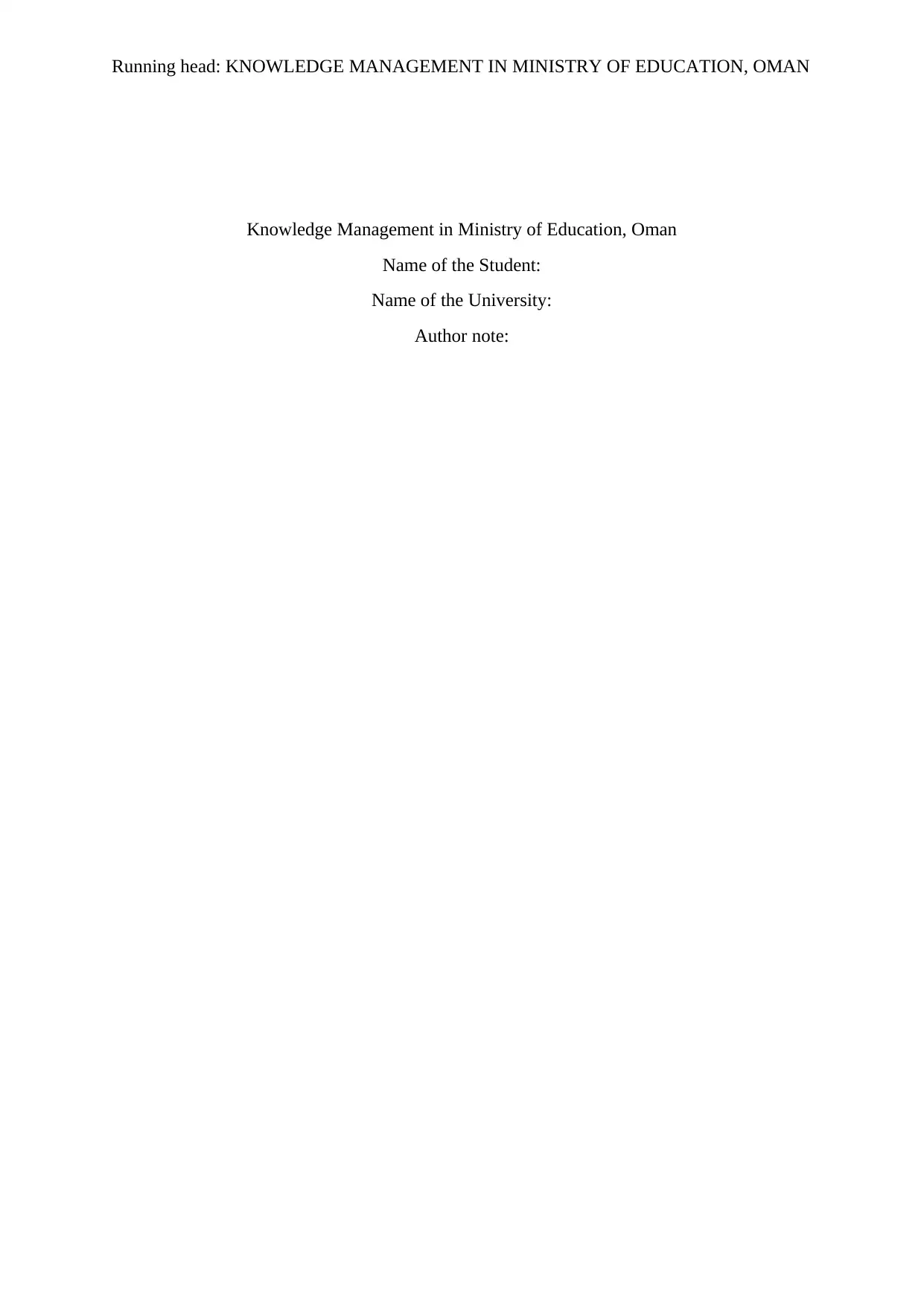
Running head: KNOWLEDGE MANAGEMENT IN MINISTRY OF EDUCATION, OMAN
Knowledge Management in Ministry of Education, Oman
Name of the Student:
Name of the University:
Author note:
Knowledge Management in Ministry of Education, Oman
Name of the Student:
Name of the University:
Author note:
Secure Best Marks with AI Grader
Need help grading? Try our AI Grader for instant feedback on your assignments.
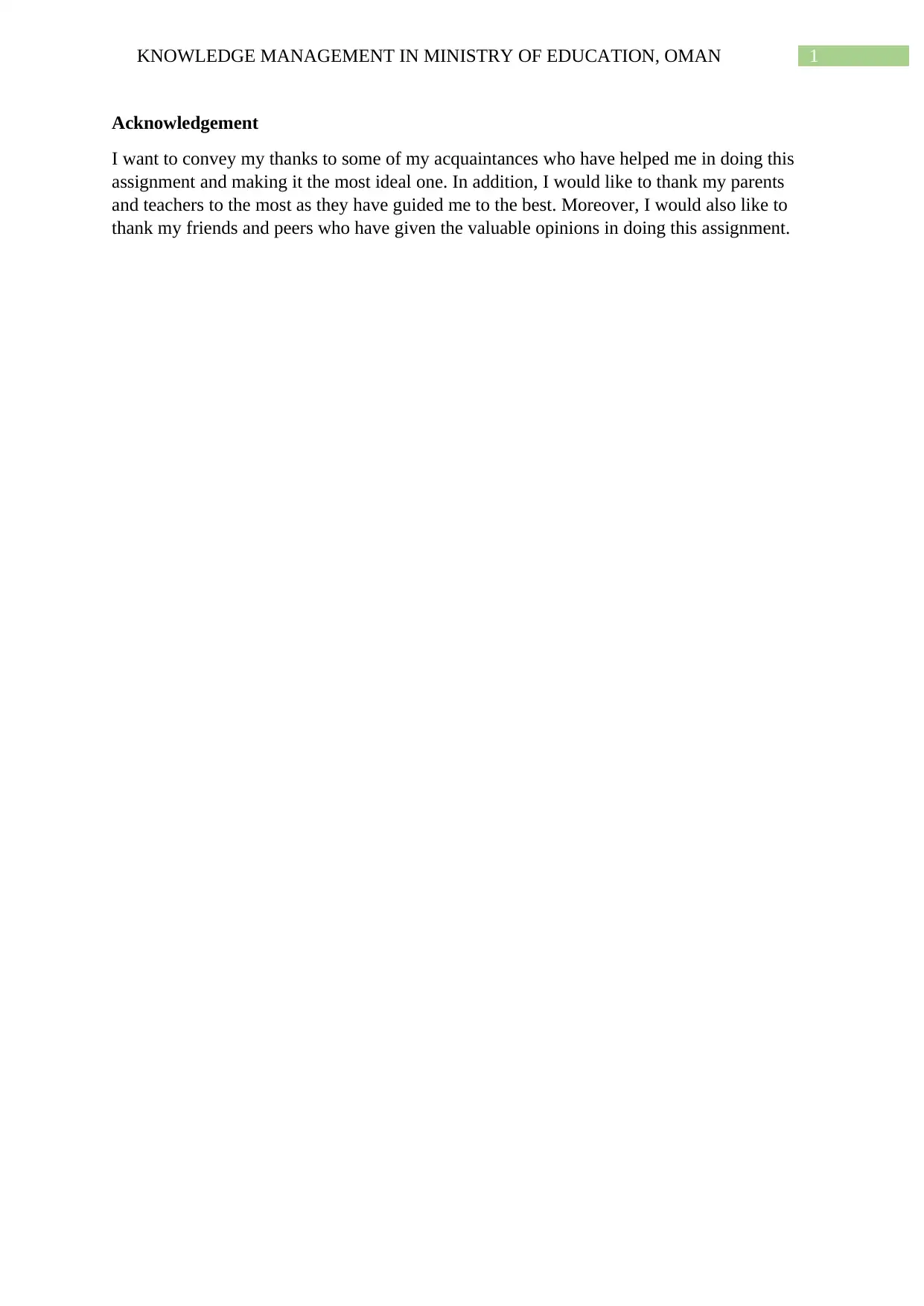
1KNOWLEDGE MANAGEMENT IN MINISTRY OF EDUCATION, OMAN
Acknowledgement
I want to convey my thanks to some of my acquaintances who have helped me in doing this
assignment and making it the most ideal one. In addition, I would like to thank my parents
and teachers to the most as they have guided me to the best. Moreover, I would also like to
thank my friends and peers who have given the valuable opinions in doing this assignment.
Acknowledgement
I want to convey my thanks to some of my acquaintances who have helped me in doing this
assignment and making it the most ideal one. In addition, I would like to thank my parents
and teachers to the most as they have guided me to the best. Moreover, I would also like to
thank my friends and peers who have given the valuable opinions in doing this assignment.
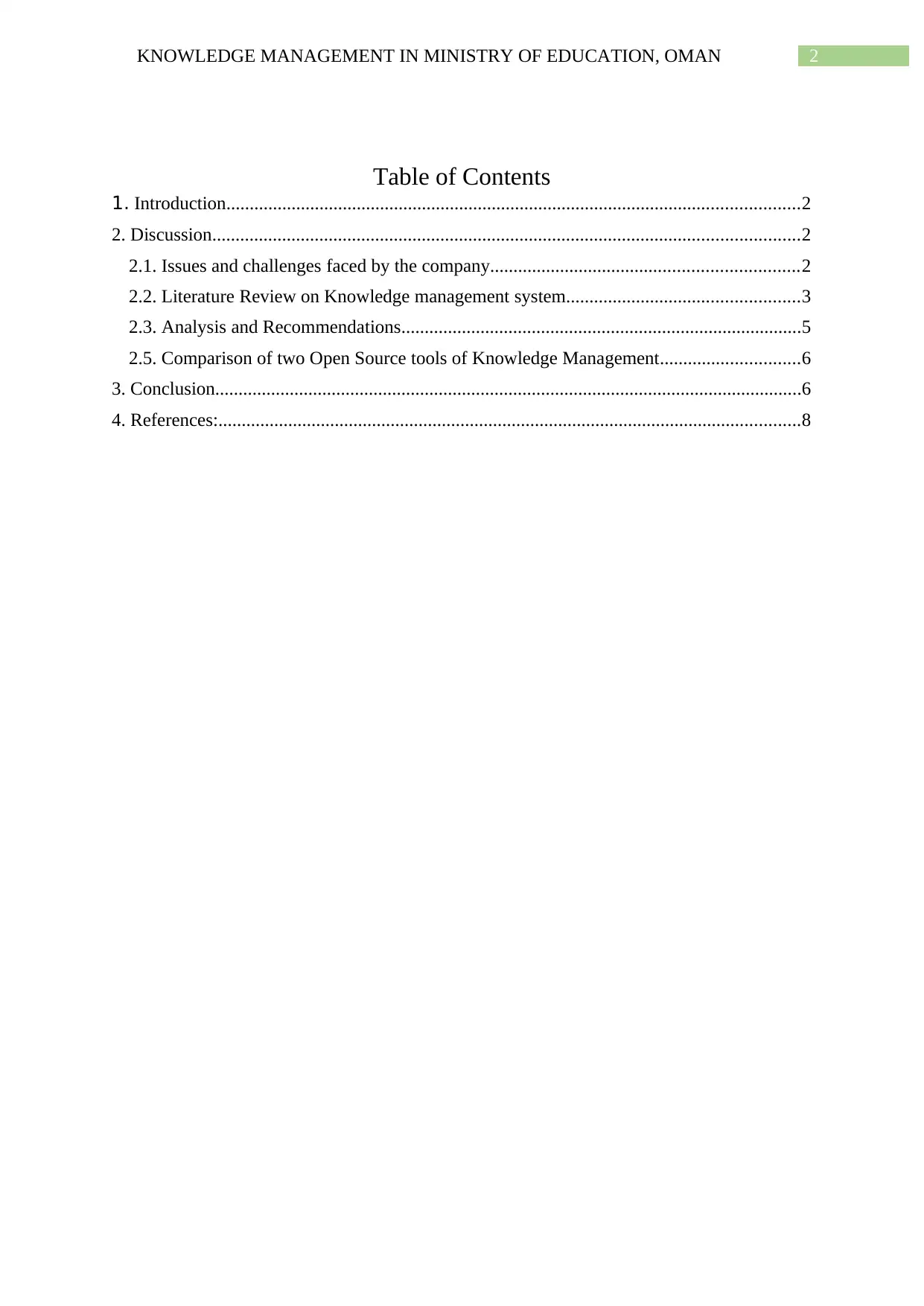
2KNOWLEDGE MANAGEMENT IN MINISTRY OF EDUCATION, OMAN
Table of Contents
1. Introduction...........................................................................................................................2
2. Discussion..............................................................................................................................2
2.1. Issues and challenges faced by the company..................................................................2
2.2. Literature Review on Knowledge management system..................................................3
2.3. Analysis and Recommendations......................................................................................5
2.5. Comparison of two Open Source tools of Knowledge Management..............................6
3. Conclusion..............................................................................................................................6
4. References:.............................................................................................................................8
Table of Contents
1. Introduction...........................................................................................................................2
2. Discussion..............................................................................................................................2
2.1. Issues and challenges faced by the company..................................................................2
2.2. Literature Review on Knowledge management system..................................................3
2.3. Analysis and Recommendations......................................................................................5
2.5. Comparison of two Open Source tools of Knowledge Management..............................6
3. Conclusion..............................................................................................................................6
4. References:.............................................................................................................................8
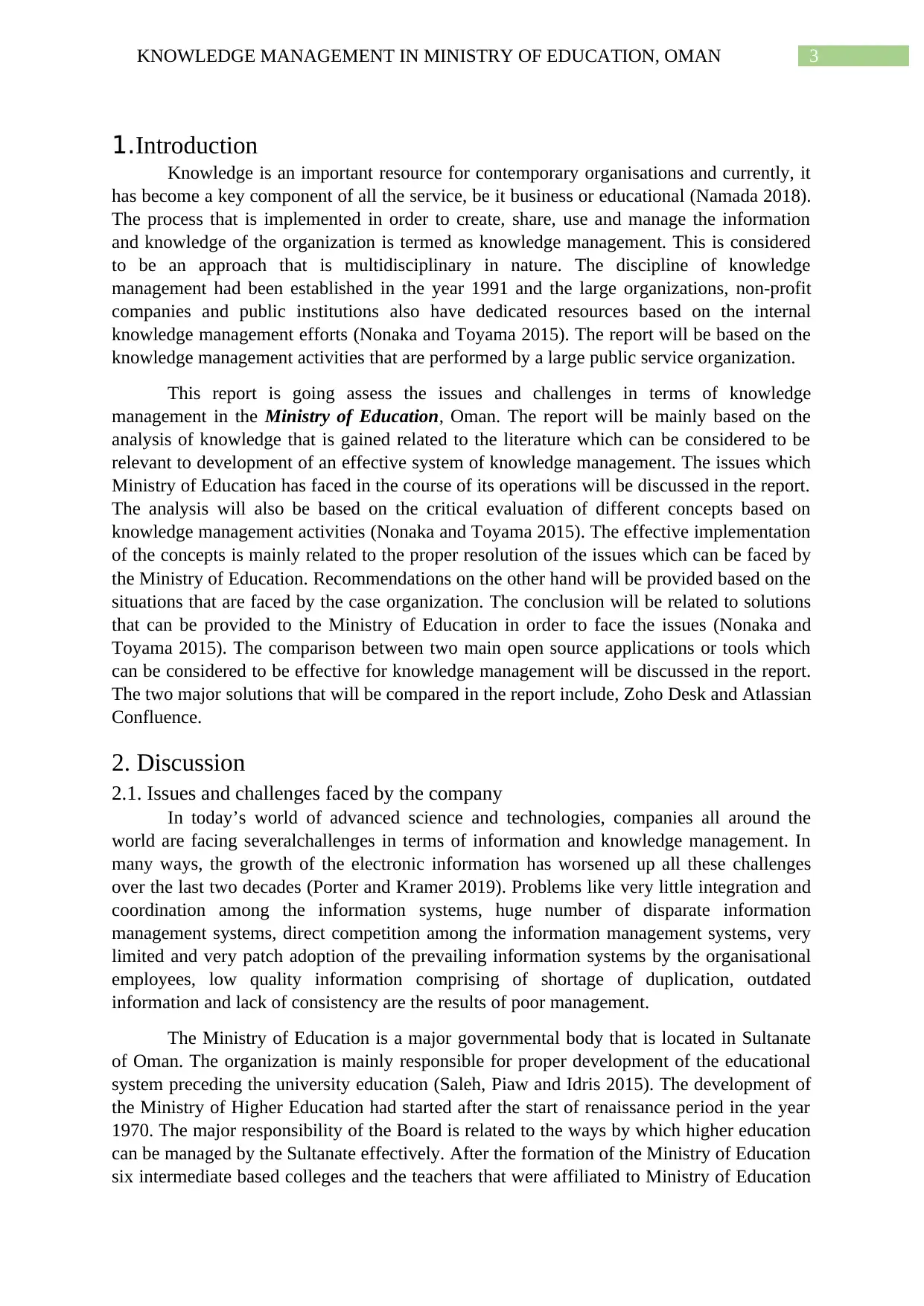
3KNOWLEDGE MANAGEMENT IN MINISTRY OF EDUCATION, OMAN
1.Introduction
Knowledge is an important resource for contemporary organisations and currently, it
has become a key component of all the service, be it business or educational (Namada 2018).
The process that is implemented in order to create, share, use and manage the information
and knowledge of the organization is termed as knowledge management. This is considered
to be an approach that is multidisciplinary in nature. The discipline of knowledge
management had been established in the year 1991 and the large organizations, non-profit
companies and public institutions also have dedicated resources based on the internal
knowledge management efforts (Nonaka and Toyama 2015). The report will be based on the
knowledge management activities that are performed by a large public service organization.
This report is going assess the issues and challenges in terms of knowledge
management in the Ministry of Education, Oman. The report will be mainly based on the
analysis of knowledge that is gained related to the literature which can be considered to be
relevant to development of an effective system of knowledge management. The issues which
Ministry of Education has faced in the course of its operations will be discussed in the report.
The analysis will also be based on the critical evaluation of different concepts based on
knowledge management activities (Nonaka and Toyama 2015). The effective implementation
of the concepts is mainly related to the proper resolution of the issues which can be faced by
the Ministry of Education. Recommendations on the other hand will be provided based on the
situations that are faced by the case organization. The conclusion will be related to solutions
that can be provided to the Ministry of Education in order to face the issues (Nonaka and
Toyama 2015). The comparison between two main open source applications or tools which
can be considered to be effective for knowledge management will be discussed in the report.
The two major solutions that will be compared in the report include, Zoho Desk and Atlassian
Confluence.
2. Discussion
2.1. Issues and challenges faced by the company
In today’s world of advanced science and technologies, companies all around the
world are facing severalchallenges in terms of information and knowledge management. In
many ways, the growth of the electronic information has worsened up all these challenges
over the last two decades (Porter and Kramer 2019). Problems like very little integration and
coordination among the information systems, huge number of disparate information
management systems, direct competition among the information management systems, very
limited and very patch adoption of the prevailing information systems by the organisational
employees, low quality information comprising of shortage of duplication, outdated
information and lack of consistency are the results of poor management.
The Ministry of Education is a major governmental body that is located in Sultanate
of Oman. The organization is mainly responsible for proper development of the educational
system preceding the university education (Saleh, Piaw and Idris 2015). The development of
the Ministry of Higher Education had started after the start of renaissance period in the year
1970. The major responsibility of the Board is related to the ways by which higher education
can be managed by the Sultanate effectively. After the formation of the Ministry of Education
six intermediate based colleges and the teachers that were affiliated to Ministry of Education
1.Introduction
Knowledge is an important resource for contemporary organisations and currently, it
has become a key component of all the service, be it business or educational (Namada 2018).
The process that is implemented in order to create, share, use and manage the information
and knowledge of the organization is termed as knowledge management. This is considered
to be an approach that is multidisciplinary in nature. The discipline of knowledge
management had been established in the year 1991 and the large organizations, non-profit
companies and public institutions also have dedicated resources based on the internal
knowledge management efforts (Nonaka and Toyama 2015). The report will be based on the
knowledge management activities that are performed by a large public service organization.
This report is going assess the issues and challenges in terms of knowledge
management in the Ministry of Education, Oman. The report will be mainly based on the
analysis of knowledge that is gained related to the literature which can be considered to be
relevant to development of an effective system of knowledge management. The issues which
Ministry of Education has faced in the course of its operations will be discussed in the report.
The analysis will also be based on the critical evaluation of different concepts based on
knowledge management activities (Nonaka and Toyama 2015). The effective implementation
of the concepts is mainly related to the proper resolution of the issues which can be faced by
the Ministry of Education. Recommendations on the other hand will be provided based on the
situations that are faced by the case organization. The conclusion will be related to solutions
that can be provided to the Ministry of Education in order to face the issues (Nonaka and
Toyama 2015). The comparison between two main open source applications or tools which
can be considered to be effective for knowledge management will be discussed in the report.
The two major solutions that will be compared in the report include, Zoho Desk and Atlassian
Confluence.
2. Discussion
2.1. Issues and challenges faced by the company
In today’s world of advanced science and technologies, companies all around the
world are facing severalchallenges in terms of information and knowledge management. In
many ways, the growth of the electronic information has worsened up all these challenges
over the last two decades (Porter and Kramer 2019). Problems like very little integration and
coordination among the information systems, huge number of disparate information
management systems, direct competition among the information management systems, very
limited and very patch adoption of the prevailing information systems by the organisational
employees, low quality information comprising of shortage of duplication, outdated
information and lack of consistency are the results of poor management.
The Ministry of Education is a major governmental body that is located in Sultanate
of Oman. The organization is mainly responsible for proper development of the educational
system preceding the university education (Saleh, Piaw and Idris 2015). The development of
the Ministry of Higher Education had started after the start of renaissance period in the year
1970. The major responsibility of the Board is related to the ways by which higher education
can be managed by the Sultanate effectively. After the formation of the Ministry of Education
six intermediate based colleges and the teachers that were affiliated to Ministry of Education
Secure Best Marks with AI Grader
Need help grading? Try our AI Grader for instant feedback on your assignments.
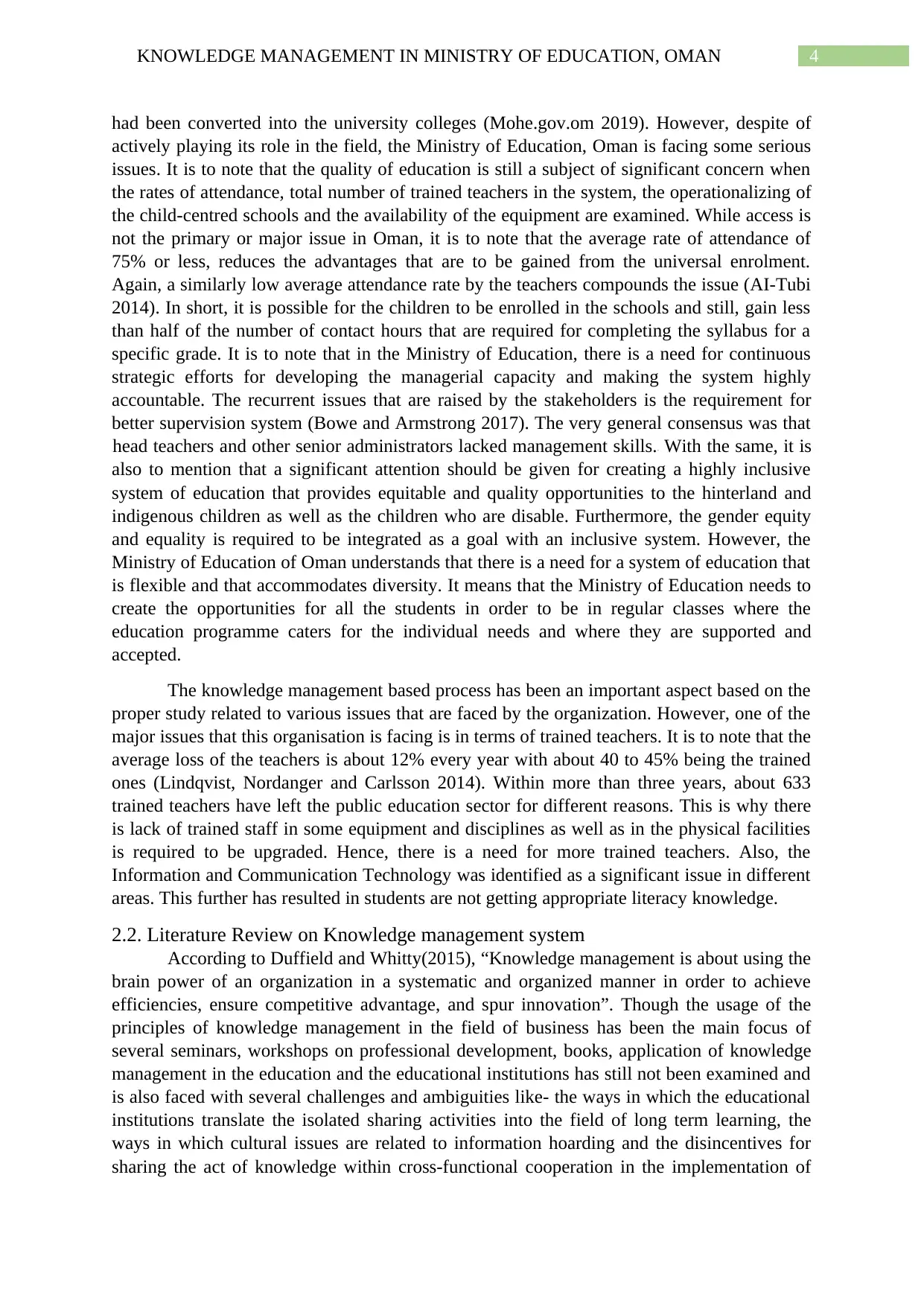
4KNOWLEDGE MANAGEMENT IN MINISTRY OF EDUCATION, OMAN
had been converted into the university colleges (Mohe.gov.om 2019). However, despite of
actively playing its role in the field, the Ministry of Education, Oman is facing some serious
issues. It is to note that the quality of education is still a subject of significant concern when
the rates of attendance, total number of trained teachers in the system, the operationalizing of
the child-centred schools and the availability of the equipment are examined. While access is
not the primary or major issue in Oman, it is to note that the average rate of attendance of
75% or less, reduces the advantages that are to be gained from the universal enrolment.
Again, a similarly low average attendance rate by the teachers compounds the issue (AI-Tubi
2014). In short, it is possible for the children to be enrolled in the schools and still, gain less
than half of the number of contact hours that are required for completing the syllabus for a
specific grade. It is to note that in the Ministry of Education, there is a need for continuous
strategic efforts for developing the managerial capacity and making the system highly
accountable. The recurrent issues that are raised by the stakeholders is the requirement for
better supervision system (Bowe and Armstrong 2017). The very general consensus was that
“head teachers and other senior administrators lacked management skills.” With the same, it is
also to mention that a significant attention should be given for creating a highly inclusive
system of education that provides equitable and quality opportunities to the hinterland and
indigenous children as well as the children who are disable. Furthermore, the gender equity
and equality is required to be integrated as a goal with an inclusive system. However, the
Ministry of Education of Oman understands that there is a need for a system of education that
is flexible and that accommodates diversity. It means that the Ministry of Education needs to
create the opportunities for all the students in order to be in regular classes where the
education programme caters for the individual needs and where they are supported and
accepted.
The knowledge management based process has been an important aspect based on the
proper study related to various issues that are faced by the organization. However, one of the
major issues that this organisation is facing is in terms of trained teachers. It is to note that the
average loss of the teachers is about 12% every year with about 40 to 45% being the trained
ones (Lindqvist, Nordanger and Carlsson 2014). Within more than three years, about 633
trained teachers have left the public education sector for different reasons. This is why there
is lack of trained staff in some equipment and disciplines as well as in the physical facilities
is required to be upgraded. Hence, there is a need for more trained teachers. Also, the
Information and Communication Technology was identified as a significant issue in different
areas. This further has resulted in students are not getting appropriate literacy knowledge.
2.2. Literature Review on Knowledge management system
According to Duffield and Whitty(2015), “Knowledge management is about using the
brain power of an organization in a systematic and organized manner in order to achieve
efficiencies, ensure competitive advantage, and spur innovation”. Though the usage of the
principles of knowledge management in the field of business has been the main focus of
several seminars, workshops on professional development, books, application of knowledge
management in the education and the educational institutions has still not been examined and
is also faced with several challenges and ambiguities like- the ways in which the educational
institutions translate the isolated sharing activities into the field of long term learning, the
ways in which cultural issues are related to information hoarding and the disincentives for
sharing the act of knowledge within cross-functional cooperation in the implementation of
had been converted into the university colleges (Mohe.gov.om 2019). However, despite of
actively playing its role in the field, the Ministry of Education, Oman is facing some serious
issues. It is to note that the quality of education is still a subject of significant concern when
the rates of attendance, total number of trained teachers in the system, the operationalizing of
the child-centred schools and the availability of the equipment are examined. While access is
not the primary or major issue in Oman, it is to note that the average rate of attendance of
75% or less, reduces the advantages that are to be gained from the universal enrolment.
Again, a similarly low average attendance rate by the teachers compounds the issue (AI-Tubi
2014). In short, it is possible for the children to be enrolled in the schools and still, gain less
than half of the number of contact hours that are required for completing the syllabus for a
specific grade. It is to note that in the Ministry of Education, there is a need for continuous
strategic efforts for developing the managerial capacity and making the system highly
accountable. The recurrent issues that are raised by the stakeholders is the requirement for
better supervision system (Bowe and Armstrong 2017). The very general consensus was that
“head teachers and other senior administrators lacked management skills.” With the same, it is
also to mention that a significant attention should be given for creating a highly inclusive
system of education that provides equitable and quality opportunities to the hinterland and
indigenous children as well as the children who are disable. Furthermore, the gender equity
and equality is required to be integrated as a goal with an inclusive system. However, the
Ministry of Education of Oman understands that there is a need for a system of education that
is flexible and that accommodates diversity. It means that the Ministry of Education needs to
create the opportunities for all the students in order to be in regular classes where the
education programme caters for the individual needs and where they are supported and
accepted.
The knowledge management based process has been an important aspect based on the
proper study related to various issues that are faced by the organization. However, one of the
major issues that this organisation is facing is in terms of trained teachers. It is to note that the
average loss of the teachers is about 12% every year with about 40 to 45% being the trained
ones (Lindqvist, Nordanger and Carlsson 2014). Within more than three years, about 633
trained teachers have left the public education sector for different reasons. This is why there
is lack of trained staff in some equipment and disciplines as well as in the physical facilities
is required to be upgraded. Hence, there is a need for more trained teachers. Also, the
Information and Communication Technology was identified as a significant issue in different
areas. This further has resulted in students are not getting appropriate literacy knowledge.
2.2. Literature Review on Knowledge management system
According to Duffield and Whitty(2015), “Knowledge management is about using the
brain power of an organization in a systematic and organized manner in order to achieve
efficiencies, ensure competitive advantage, and spur innovation”. Though the usage of the
principles of knowledge management in the field of business has been the main focus of
several seminars, workshops on professional development, books, application of knowledge
management in the education and the educational institutions has still not been examined and
is also faced with several challenges and ambiguities like- the ways in which the educational
institutions translate the isolated sharing activities into the field of long term learning, the
ways in which cultural issues are related to information hoarding and the disincentives for
sharing the act of knowledge within cross-functional cooperation in the implementation of
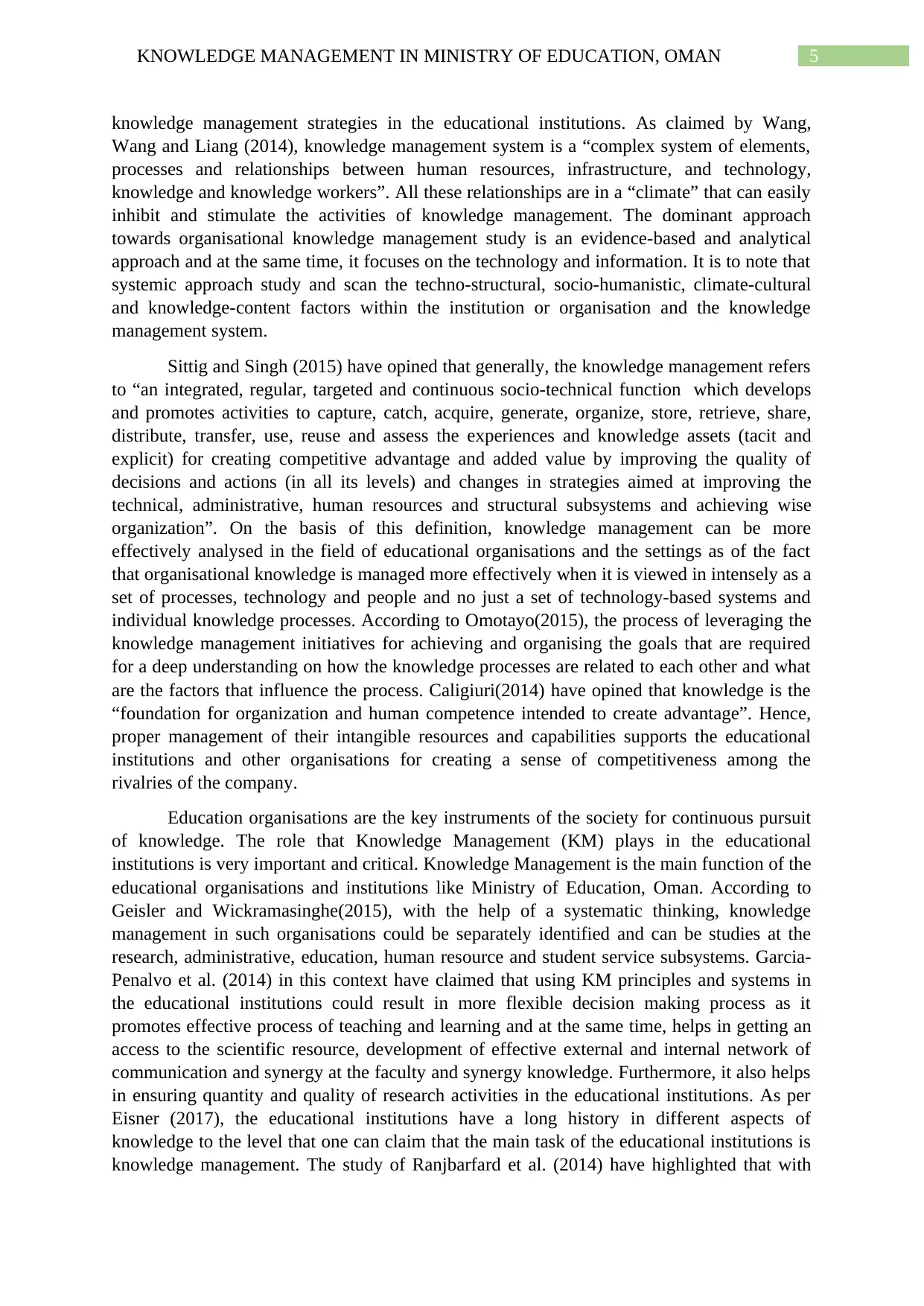
5KNOWLEDGE MANAGEMENT IN MINISTRY OF EDUCATION, OMAN
knowledge management strategies in the educational institutions. As claimed by Wang,
Wang and Liang (2014), knowledge management system is a “complex system of elements,
processes and relationships between human resources, infrastructure, and technology,
knowledge and knowledge workers”. All these relationships are in a “climate” that can easily
inhibit and stimulate the activities of knowledge management. The dominant approach
towards organisational knowledge management study is an evidence-based and analytical
approach and at the same time, it focuses on the technology and information. It is to note that
systemic approach study and scan the techno-structural, socio-humanistic, climate-cultural
and knowledge-content factors within the institution or organisation and the knowledge
management system.
Sittig and Singh (2015) have opined that generally, the knowledge management refers
to “an integrated, regular, targeted and continuous socio-technical function which develops
and promotes activities to capture, catch, acquire, generate, organize, store, retrieve, share,
distribute, transfer, use, reuse and assess the experiences and knowledge assets (tacit and
explicit) for creating competitive advantage and added value by improving the quality of
decisions and actions (in all its levels) and changes in strategies aimed at improving the
technical, administrative, human resources and structural subsystems and achieving wise
organization”. On the basis of this definition, knowledge management can be more
effectively analysed in the field of educational organisations and the settings as of the fact
that organisational knowledge is managed more effectively when it is viewed in intensely as a
set of processes, technology and people and no just a set of technology-based systems and
individual knowledge processes. According to Omotayo(2015), the process of leveraging the
knowledge management initiatives for achieving and organising the goals that are required
for a deep understanding on how the knowledge processes are related to each other and what
are the factors that influence the process. Caligiuri(2014) have opined that knowledge is the
“foundation for organization and human competence intended to create advantage”. Hence,
proper management of their intangible resources and capabilities supports the educational
institutions and other organisations for creating a sense of competitiveness among the
rivalries of the company.
Education organisations are the key instruments of the society for continuous pursuit
of knowledge. The role that Knowledge Management (KM) plays in the educational
institutions is very important and critical. Knowledge Management is the main function of the
educational organisations and institutions like Ministry of Education, Oman. According to
Geisler and Wickramasinghe(2015), with the help of a systematic thinking, knowledge
management in such organisations could be separately identified and can be studies at the
research, administrative, education, human resource and student service subsystems. Garcia-
Penalvo et al. (2014) in this context have claimed that using KM principles and systems in
the educational institutions could result in more flexible decision making process as it
promotes effective process of teaching and learning and at the same time, helps in getting an
access to the scientific resource, development of effective external and internal network of
communication and synergy at the faculty and synergy knowledge. Furthermore, it also helps
in ensuring quantity and quality of research activities in the educational institutions. As per
Eisner (2017), the educational institutions have a long history in different aspects of
knowledge to the level that one can claim that the main task of the educational institutions is
knowledge management. The study of Ranjbarfard et al. (2014) have highlighted that with
knowledge management strategies in the educational institutions. As claimed by Wang,
Wang and Liang (2014), knowledge management system is a “complex system of elements,
processes and relationships between human resources, infrastructure, and technology,
knowledge and knowledge workers”. All these relationships are in a “climate” that can easily
inhibit and stimulate the activities of knowledge management. The dominant approach
towards organisational knowledge management study is an evidence-based and analytical
approach and at the same time, it focuses on the technology and information. It is to note that
systemic approach study and scan the techno-structural, socio-humanistic, climate-cultural
and knowledge-content factors within the institution or organisation and the knowledge
management system.
Sittig and Singh (2015) have opined that generally, the knowledge management refers
to “an integrated, regular, targeted and continuous socio-technical function which develops
and promotes activities to capture, catch, acquire, generate, organize, store, retrieve, share,
distribute, transfer, use, reuse and assess the experiences and knowledge assets (tacit and
explicit) for creating competitive advantage and added value by improving the quality of
decisions and actions (in all its levels) and changes in strategies aimed at improving the
technical, administrative, human resources and structural subsystems and achieving wise
organization”. On the basis of this definition, knowledge management can be more
effectively analysed in the field of educational organisations and the settings as of the fact
that organisational knowledge is managed more effectively when it is viewed in intensely as a
set of processes, technology and people and no just a set of technology-based systems and
individual knowledge processes. According to Omotayo(2015), the process of leveraging the
knowledge management initiatives for achieving and organising the goals that are required
for a deep understanding on how the knowledge processes are related to each other and what
are the factors that influence the process. Caligiuri(2014) have opined that knowledge is the
“foundation for organization and human competence intended to create advantage”. Hence,
proper management of their intangible resources and capabilities supports the educational
institutions and other organisations for creating a sense of competitiveness among the
rivalries of the company.
Education organisations are the key instruments of the society for continuous pursuit
of knowledge. The role that Knowledge Management (KM) plays in the educational
institutions is very important and critical. Knowledge Management is the main function of the
educational organisations and institutions like Ministry of Education, Oman. According to
Geisler and Wickramasinghe(2015), with the help of a systematic thinking, knowledge
management in such organisations could be separately identified and can be studies at the
research, administrative, education, human resource and student service subsystems. Garcia-
Penalvo et al. (2014) in this context have claimed that using KM principles and systems in
the educational institutions could result in more flexible decision making process as it
promotes effective process of teaching and learning and at the same time, helps in getting an
access to the scientific resource, development of effective external and internal network of
communication and synergy at the faculty and synergy knowledge. Furthermore, it also helps
in ensuring quantity and quality of research activities in the educational institutions. As per
Eisner (2017), the educational institutions have a long history in different aspects of
knowledge to the level that one can claim that the main task of the educational institutions is
knowledge management. The study of Ranjbarfard et al. (2014) have highlighted that with
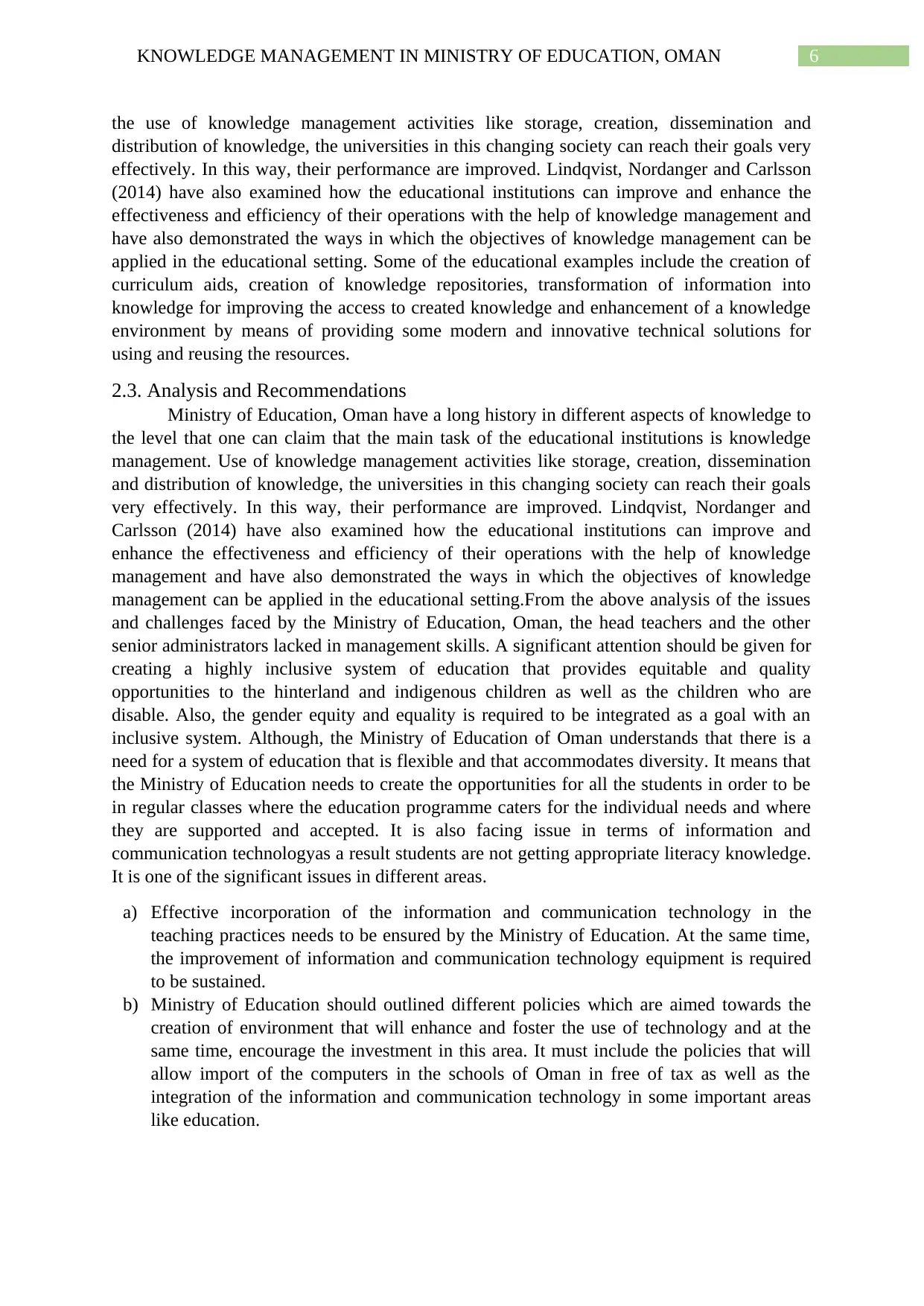
6KNOWLEDGE MANAGEMENT IN MINISTRY OF EDUCATION, OMAN
the use of knowledge management activities like storage, creation, dissemination and
distribution of knowledge, the universities in this changing society can reach their goals very
effectively. In this way, their performance are improved. Lindqvist, Nordanger and Carlsson
(2014) have also examined how the educational institutions can improve and enhance the
effectiveness and efficiency of their operations with the help of knowledge management and
have also demonstrated the ways in which the objectives of knowledge management can be
applied in the educational setting. Some of the educational examples include the creation of
curriculum aids, creation of knowledge repositories, transformation of information into
knowledge for improving the access to created knowledge and enhancement of a knowledge
environment by means of providing some modern and innovative technical solutions for
using and reusing the resources.
2.3. Analysis and Recommendations
Ministry of Education, Oman have a long history in different aspects of knowledge to
the level that one can claim that the main task of the educational institutions is knowledge
management. Use of knowledge management activities like storage, creation, dissemination
and distribution of knowledge, the universities in this changing society can reach their goals
very effectively. In this way, their performance are improved. Lindqvist, Nordanger and
Carlsson (2014) have also examined how the educational institutions can improve and
enhance the effectiveness and efficiency of their operations with the help of knowledge
management and have also demonstrated the ways in which the objectives of knowledge
management can be applied in the educational setting.From the above analysis of the issues
and challenges faced by the Ministry of Education, Oman, the head teachers and the other
senior administrators lacked in management skills. A significant attention should be given for
creating a highly inclusive system of education that provides equitable and quality
opportunities to the hinterland and indigenous children as well as the children who are
disable. Also, the gender equity and equality is required to be integrated as a goal with an
inclusive system. Although, the Ministry of Education of Oman understands that there is a
need for a system of education that is flexible and that accommodates diversity. It means that
the Ministry of Education needs to create the opportunities for all the students in order to be
in regular classes where the education programme caters for the individual needs and where
they are supported and accepted. It is also facing issue in terms of information and
communication technologyas a result students are not getting appropriate literacy knowledge.
It is one of the significant issues in different areas.
a) Effective incorporation of the information and communication technology in the
teaching practices needs to be ensured by the Ministry of Education. At the same time,
the improvement of information and communication technology equipment is required
to be sustained.
b) Ministry of Education should outlined different policies which are aimed towards the
creation of environment that will enhance and foster the use of technology and at the
same time, encourage the investment in this area. It must include the policies that will
allow import of the computers in the schools of Oman in free of tax as well as the
integration of the information and communication technology in some important areas
like education.
the use of knowledge management activities like storage, creation, dissemination and
distribution of knowledge, the universities in this changing society can reach their goals very
effectively. In this way, their performance are improved. Lindqvist, Nordanger and Carlsson
(2014) have also examined how the educational institutions can improve and enhance the
effectiveness and efficiency of their operations with the help of knowledge management and
have also demonstrated the ways in which the objectives of knowledge management can be
applied in the educational setting. Some of the educational examples include the creation of
curriculum aids, creation of knowledge repositories, transformation of information into
knowledge for improving the access to created knowledge and enhancement of a knowledge
environment by means of providing some modern and innovative technical solutions for
using and reusing the resources.
2.3. Analysis and Recommendations
Ministry of Education, Oman have a long history in different aspects of knowledge to
the level that one can claim that the main task of the educational institutions is knowledge
management. Use of knowledge management activities like storage, creation, dissemination
and distribution of knowledge, the universities in this changing society can reach their goals
very effectively. In this way, their performance are improved. Lindqvist, Nordanger and
Carlsson (2014) have also examined how the educational institutions can improve and
enhance the effectiveness and efficiency of their operations with the help of knowledge
management and have also demonstrated the ways in which the objectives of knowledge
management can be applied in the educational setting.From the above analysis of the issues
and challenges faced by the Ministry of Education, Oman, the head teachers and the other
senior administrators lacked in management skills. A significant attention should be given for
creating a highly inclusive system of education that provides equitable and quality
opportunities to the hinterland and indigenous children as well as the children who are
disable. Also, the gender equity and equality is required to be integrated as a goal with an
inclusive system. Although, the Ministry of Education of Oman understands that there is a
need for a system of education that is flexible and that accommodates diversity. It means that
the Ministry of Education needs to create the opportunities for all the students in order to be
in regular classes where the education programme caters for the individual needs and where
they are supported and accepted. It is also facing issue in terms of information and
communication technologyas a result students are not getting appropriate literacy knowledge.
It is one of the significant issues in different areas.
a) Effective incorporation of the information and communication technology in the
teaching practices needs to be ensured by the Ministry of Education. At the same time,
the improvement of information and communication technology equipment is required
to be sustained.
b) Ministry of Education should outlined different policies which are aimed towards the
creation of environment that will enhance and foster the use of technology and at the
same time, encourage the investment in this area. It must include the policies that will
allow import of the computers in the schools of Oman in free of tax as well as the
integration of the information and communication technology in some important areas
like education.
Paraphrase This Document
Need a fresh take? Get an instant paraphrase of this document with our AI Paraphraser
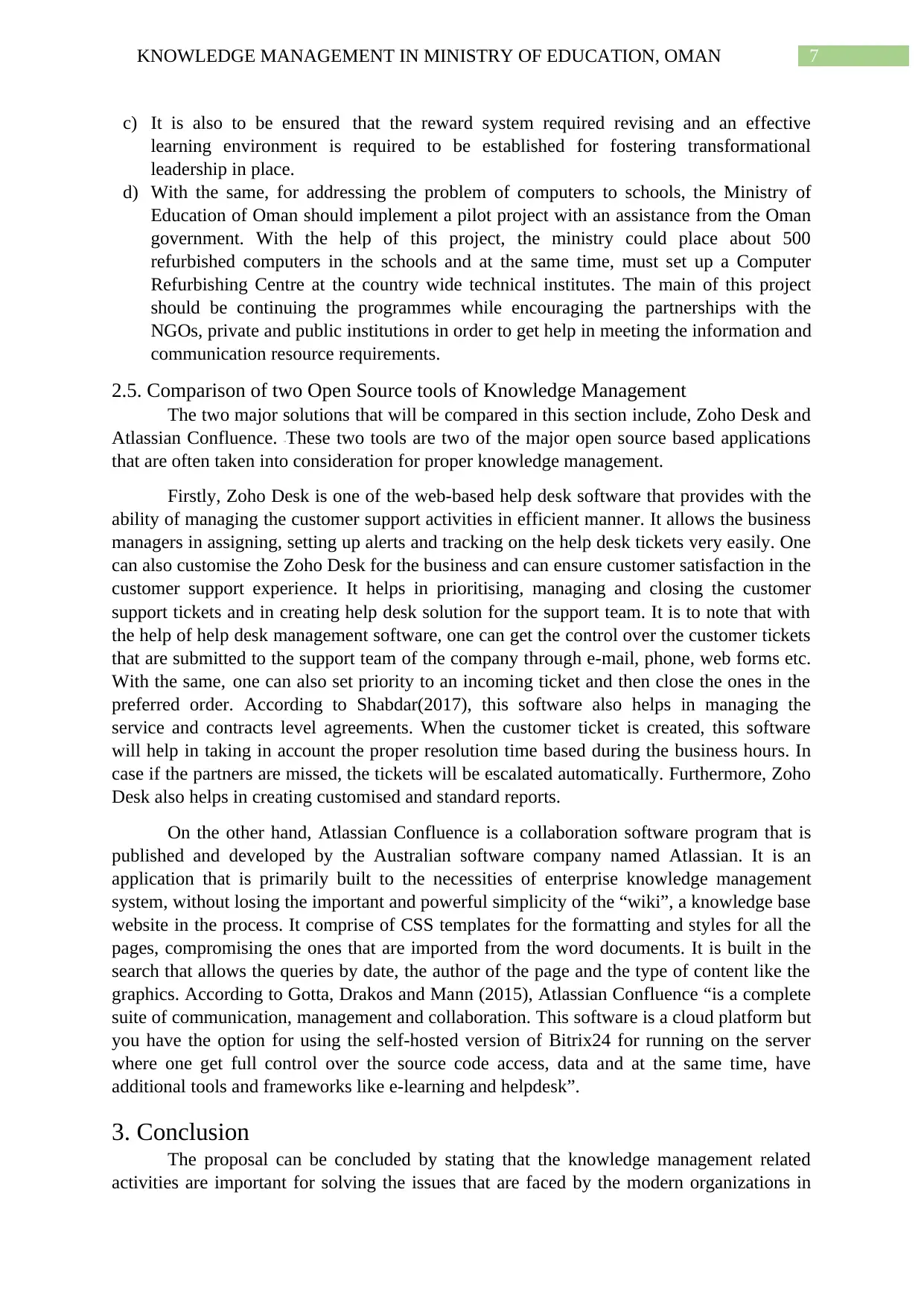
7KNOWLEDGE MANAGEMENT IN MINISTRY OF EDUCATION, OMAN
c) It is also to be ensured “that the reward system required revising and an effective
learning environment is required to be established for fostering transformational
leadership in place.”
d) With the same, for addressing the problem of computers to schools, the Ministry of
Education of Oman should implement a pilot project with an assistance from the Oman
government. With the help of this project, the ministry could place about 500
refurbished computers in the schools and at the same time, must set up a Computer
Refurbishing Centre at the country wide technical institutes. The main of this project
should be continuing the programmes while encouraging the partnerships with the
NGOs, private and public institutions in order to get help in meeting the information and
communication resource requirements.
2.5. Comparison of two Open Source tools of Knowledge Management
The two major solutions that will be compared in this section include, Zoho Desk and
Atlassian Confluence. “These two tools are two of the major open source based applications
that are often taken into consideration for proper knowledge management.”
Firstly, Zoho Desk is one of the web-based help desk software that provides with the
ability of managing the customer support activities in efficient manner. It allows the business
managers in assigning, setting up alerts and tracking on the help desk tickets very easily. One
can also customise the Zoho Desk for the business and can ensure customer satisfaction in the
customer support experience. It helps in prioritising, managing and closing the customer
support tickets and in creating help desk solution for the support team. It is to note that with
the help of help desk management software, one can get the control over the customer tickets
that are submitted to the support team of the company through e-mail, phone, web forms etc.
With the same, “one can also set priority to an incoming ticket and then close the ones in the
preferred order.” According to Shabdar(2017), this software also helps in managing the
service and contracts level agreements. When the customer ticket is created, this software
will help in taking in account the proper resolution time based during the business hours. In
case if the partners are missed, the tickets will be escalated automatically. Furthermore, Zoho
Desk also helps in creating customised and standard reports.
On the other hand, Atlassian Confluence is a collaboration software program that is
published and developed by the Australian software company named Atlassian. It is an
application that is primarily built to the necessities of enterprise knowledge management
system, without losing the important and powerful simplicity of the “wiki”, a knowledge base
website in the process. It comprise of CSS templates for the formatting and styles for all the
pages, compromising the ones that are imported from the word documents. It is built in the
search that allows the queries by date, the author of the page and the type of content like the
graphics. According to Gotta, Drakos and Mann (2015), Atlassian Confluence “is a complete
suite of communication, management and collaboration. This software is a cloud platform but
you have the option for using the self-hosted version of Bitrix24 for running on the server
where one get full control over the source code access, data and at the same time, have
additional tools and frameworks like e-learning and helpdesk”.
3. Conclusion
The proposal can be concluded by stating that the knowledge management related
activities are important for solving the issues that are faced by the modern organizations in
c) It is also to be ensured “that the reward system required revising and an effective
learning environment is required to be established for fostering transformational
leadership in place.”
d) With the same, for addressing the problem of computers to schools, the Ministry of
Education of Oman should implement a pilot project with an assistance from the Oman
government. With the help of this project, the ministry could place about 500
refurbished computers in the schools and at the same time, must set up a Computer
Refurbishing Centre at the country wide technical institutes. The main of this project
should be continuing the programmes while encouraging the partnerships with the
NGOs, private and public institutions in order to get help in meeting the information and
communication resource requirements.
2.5. Comparison of two Open Source tools of Knowledge Management
The two major solutions that will be compared in this section include, Zoho Desk and
Atlassian Confluence. “These two tools are two of the major open source based applications
that are often taken into consideration for proper knowledge management.”
Firstly, Zoho Desk is one of the web-based help desk software that provides with the
ability of managing the customer support activities in efficient manner. It allows the business
managers in assigning, setting up alerts and tracking on the help desk tickets very easily. One
can also customise the Zoho Desk for the business and can ensure customer satisfaction in the
customer support experience. It helps in prioritising, managing and closing the customer
support tickets and in creating help desk solution for the support team. It is to note that with
the help of help desk management software, one can get the control over the customer tickets
that are submitted to the support team of the company through e-mail, phone, web forms etc.
With the same, “one can also set priority to an incoming ticket and then close the ones in the
preferred order.” According to Shabdar(2017), this software also helps in managing the
service and contracts level agreements. When the customer ticket is created, this software
will help in taking in account the proper resolution time based during the business hours. In
case if the partners are missed, the tickets will be escalated automatically. Furthermore, Zoho
Desk also helps in creating customised and standard reports.
On the other hand, Atlassian Confluence is a collaboration software program that is
published and developed by the Australian software company named Atlassian. It is an
application that is primarily built to the necessities of enterprise knowledge management
system, without losing the important and powerful simplicity of the “wiki”, a knowledge base
website in the process. It comprise of CSS templates for the formatting and styles for all the
pages, compromising the ones that are imported from the word documents. It is built in the
search that allows the queries by date, the author of the page and the type of content like the
graphics. According to Gotta, Drakos and Mann (2015), Atlassian Confluence “is a complete
suite of communication, management and collaboration. This software is a cloud platform but
you have the option for using the self-hosted version of Bitrix24 for running on the server
where one get full control over the source code access, data and at the same time, have
additional tools and frameworks like e-learning and helpdesk”.
3. Conclusion
The proposal can be concluded by stating that the knowledge management related
activities are important for solving the issues that are faced by the modern organizations in
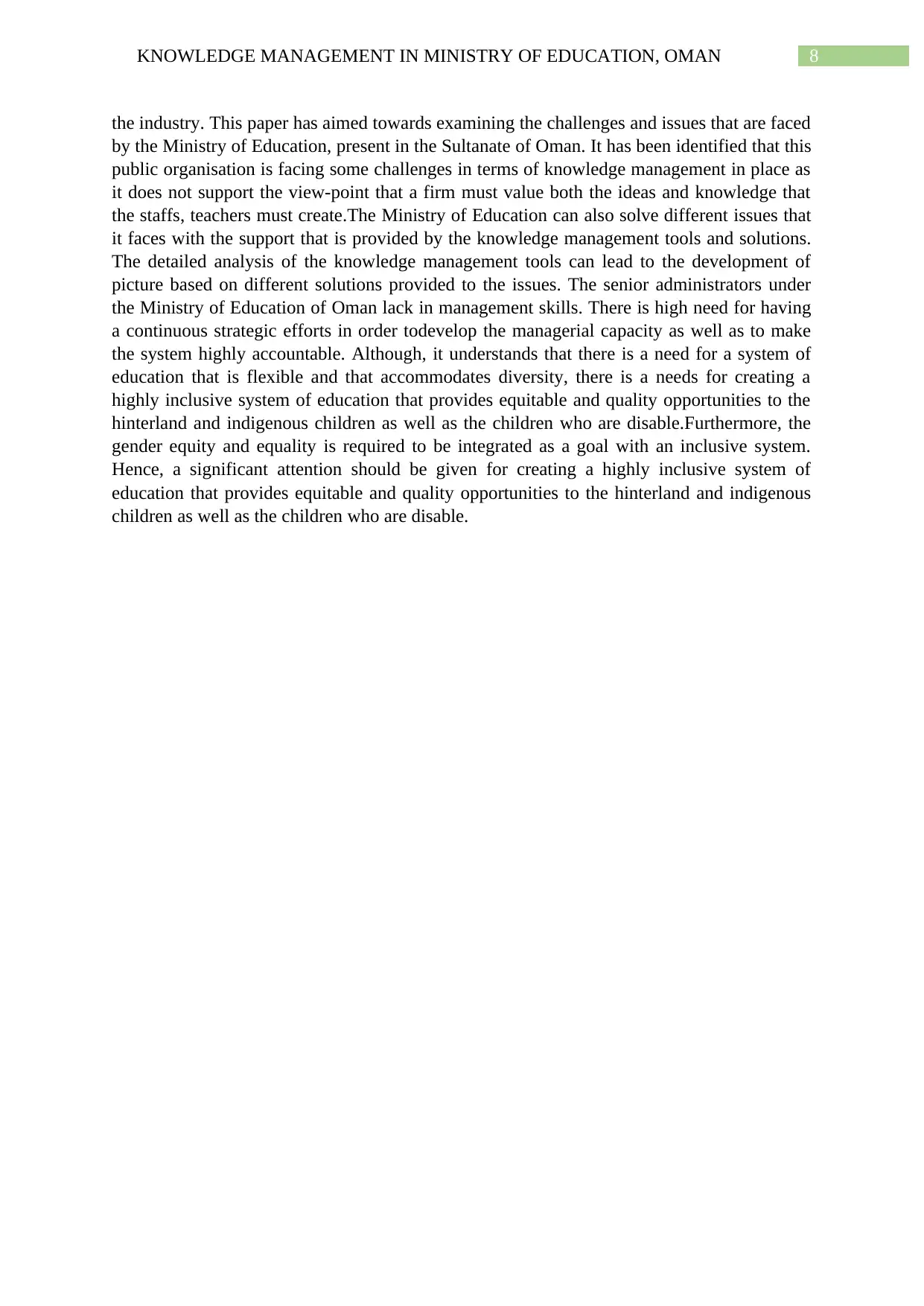
8KNOWLEDGE MANAGEMENT IN MINISTRY OF EDUCATION, OMAN
the industry. This paper has aimed towards examining the challenges and issues that are faced
by the Ministry of Education, present in the Sultanate of Oman. It has been identified that this
public organisation is facing some challenges in terms of knowledge management in place as
it does not support the view-point that a firm must value both the ideas and knowledge that
the staffs, teachers must create.The Ministry of Education can also solve different issues that
it faces with the support that is provided by the knowledge management tools and solutions.
The detailed analysis of the knowledge management tools can lead to the development of
picture based on different solutions provided to the issues. The senior administrators under
the Ministry of Education of Oman lack in management skills. There is high need for having
a continuous strategic efforts in order todevelop the managerial capacity as well as to make
the system highly accountable. Although, it understands that there is a need for a system of
education that is flexible and that accommodates diversity, there is a needs for creating a
highly inclusive system of education that provides equitable and quality opportunities to the
hinterland and indigenous children as well as the children who are disable.Furthermore, the
gender equity and equality is required to be integrated as a goal with an inclusive system.
Hence, a significant attention should be given for creating a highly inclusive system of
education that provides equitable and quality opportunities to the hinterland and indigenous
children as well as the children who are disable.
the industry. This paper has aimed towards examining the challenges and issues that are faced
by the Ministry of Education, present in the Sultanate of Oman. It has been identified that this
public organisation is facing some challenges in terms of knowledge management in place as
it does not support the view-point that a firm must value both the ideas and knowledge that
the staffs, teachers must create.The Ministry of Education can also solve different issues that
it faces with the support that is provided by the knowledge management tools and solutions.
The detailed analysis of the knowledge management tools can lead to the development of
picture based on different solutions provided to the issues. The senior administrators under
the Ministry of Education of Oman lack in management skills. There is high need for having
a continuous strategic efforts in order todevelop the managerial capacity as well as to make
the system highly accountable. Although, it understands that there is a need for a system of
education that is flexible and that accommodates diversity, there is a needs for creating a
highly inclusive system of education that provides equitable and quality opportunities to the
hinterland and indigenous children as well as the children who are disable.Furthermore, the
gender equity and equality is required to be integrated as a goal with an inclusive system.
Hence, a significant attention should be given for creating a highly inclusive system of
education that provides equitable and quality opportunities to the hinterland and indigenous
children as well as the children who are disable.
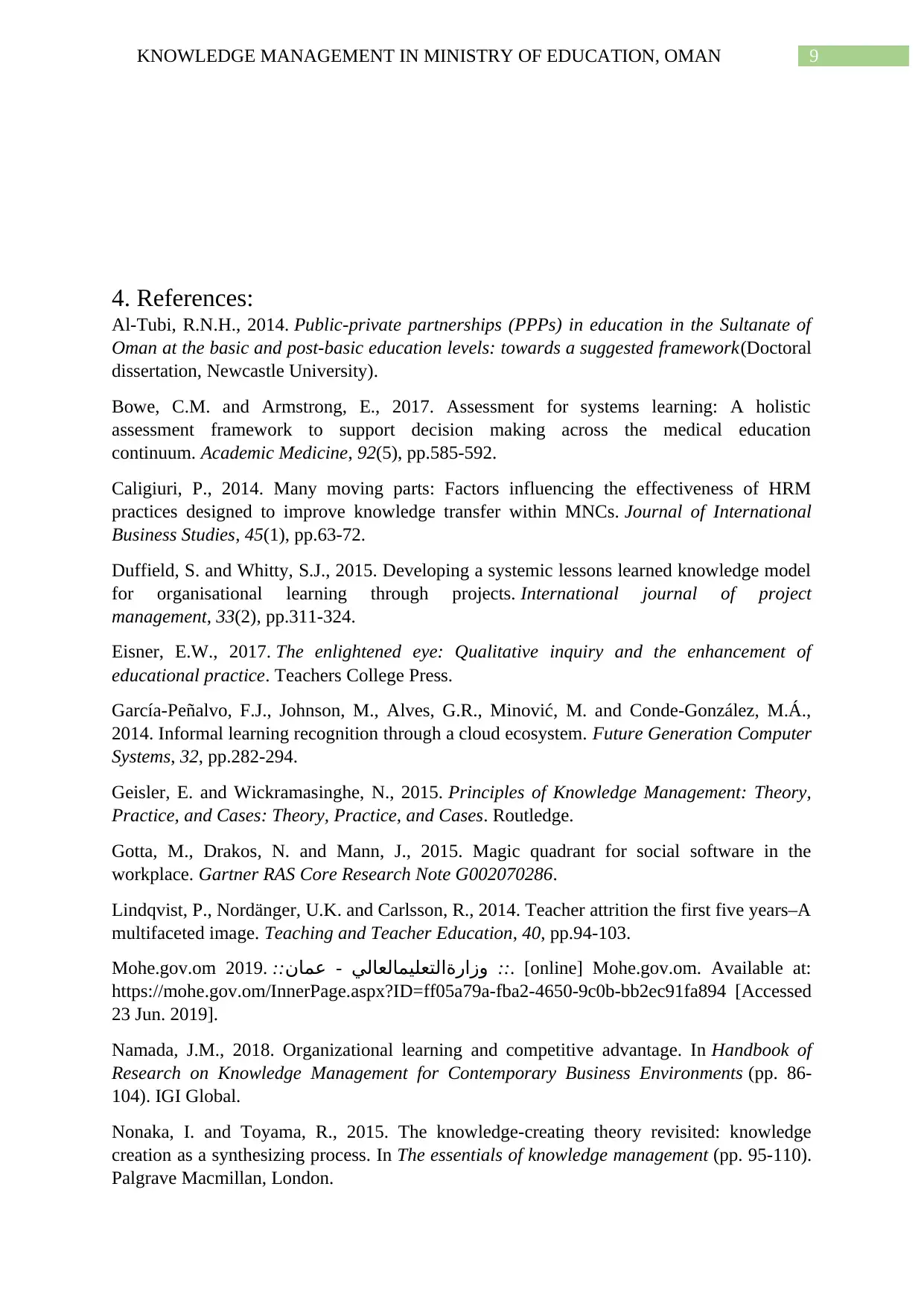
9KNOWLEDGE MANAGEMENT IN MINISTRY OF EDUCATION, OMAN
4. References:
Al-Tubi, R.N.H., 2014. Public-private partnerships (PPPs) in education in the Sultanate of
Oman at the basic and post-basic education levels: towards a suggested framework(Doctoral
dissertation, Newcastle University).
Bowe, C.M. and Armstrong, E., 2017. Assessment for systems learning: A holistic
assessment framework to support decision making across the medical education
continuum. Academic Medicine, 92(5), pp.585-592.
Caligiuri, P., 2014. Many moving parts: Factors influencing the effectiveness of HRM
practices designed to improve knowledge transfer within MNCs. Journal of International
Business Studies, 45(1), pp.63-72.
Duffield, S. and Whitty, S.J., 2015. Developing a systemic lessons learned knowledge model
for organisational learning through projects. International journal of project
management, 33(2), pp.311-324.
Eisner, E.W., 2017. The enlightened eye: Qualitative inquiry and the enhancement of
educational practice. Teachers College Press.
García-Peñalvo, F.J., Johnson, M., Alves, G.R., Minović, M. and Conde-González, M.Á.,
2014. Informal learning recognition through a cloud ecosystem. Future Generation Computer
Systems, 32, pp.282-294.
Geisler, E. and Wickramasinghe, N., 2015. Principles of Knowledge Management: Theory,
Practice, and Cases: Theory, Practice, and Cases. Routledge.
Gotta, M., Drakos, N. and Mann, J., 2015. Magic quadrant for social software in the
workplace. Gartner RAS Core Research Note G002070286.
Lindqvist, P., Nordänger, U.K. and Carlsson, R., 2014. Teacher attrition the first five years–A
multifaceted image. Teaching and Teacher Education, 40, pp.94-103.
Mohe.gov.om 2019. :: -عمان وزارةالتعليمالعالي ::. [online] Mohe.gov.om. Available at:
https://mohe.gov.om/InnerPage.aspx?ID=ff05a79a-fba2-4650-9c0b-bb2ec91fa894 [Accessed
23 Jun. 2019].
Namada, J.M., 2018. Organizational learning and competitive advantage. In Handbook of
Research on Knowledge Management for Contemporary Business Environments (pp. 86-
104). IGI Global.
Nonaka, I. and Toyama, R., 2015. The knowledge-creating theory revisited: knowledge
creation as a synthesizing process. In The essentials of knowledge management (pp. 95-110).
Palgrave Macmillan, London.
4. References:
Al-Tubi, R.N.H., 2014. Public-private partnerships (PPPs) in education in the Sultanate of
Oman at the basic and post-basic education levels: towards a suggested framework(Doctoral
dissertation, Newcastle University).
Bowe, C.M. and Armstrong, E., 2017. Assessment for systems learning: A holistic
assessment framework to support decision making across the medical education
continuum. Academic Medicine, 92(5), pp.585-592.
Caligiuri, P., 2014. Many moving parts: Factors influencing the effectiveness of HRM
practices designed to improve knowledge transfer within MNCs. Journal of International
Business Studies, 45(1), pp.63-72.
Duffield, S. and Whitty, S.J., 2015. Developing a systemic lessons learned knowledge model
for organisational learning through projects. International journal of project
management, 33(2), pp.311-324.
Eisner, E.W., 2017. The enlightened eye: Qualitative inquiry and the enhancement of
educational practice. Teachers College Press.
García-Peñalvo, F.J., Johnson, M., Alves, G.R., Minović, M. and Conde-González, M.Á.,
2014. Informal learning recognition through a cloud ecosystem. Future Generation Computer
Systems, 32, pp.282-294.
Geisler, E. and Wickramasinghe, N., 2015. Principles of Knowledge Management: Theory,
Practice, and Cases: Theory, Practice, and Cases. Routledge.
Gotta, M., Drakos, N. and Mann, J., 2015. Magic quadrant for social software in the
workplace. Gartner RAS Core Research Note G002070286.
Lindqvist, P., Nordänger, U.K. and Carlsson, R., 2014. Teacher attrition the first five years–A
multifaceted image. Teaching and Teacher Education, 40, pp.94-103.
Mohe.gov.om 2019. :: -عمان وزارةالتعليمالعالي ::. [online] Mohe.gov.om. Available at:
https://mohe.gov.om/InnerPage.aspx?ID=ff05a79a-fba2-4650-9c0b-bb2ec91fa894 [Accessed
23 Jun. 2019].
Namada, J.M., 2018. Organizational learning and competitive advantage. In Handbook of
Research on Knowledge Management for Contemporary Business Environments (pp. 86-
104). IGI Global.
Nonaka, I. and Toyama, R., 2015. The knowledge-creating theory revisited: knowledge
creation as a synthesizing process. In The essentials of knowledge management (pp. 95-110).
Palgrave Macmillan, London.
Secure Best Marks with AI Grader
Need help grading? Try our AI Grader for instant feedback on your assignments.
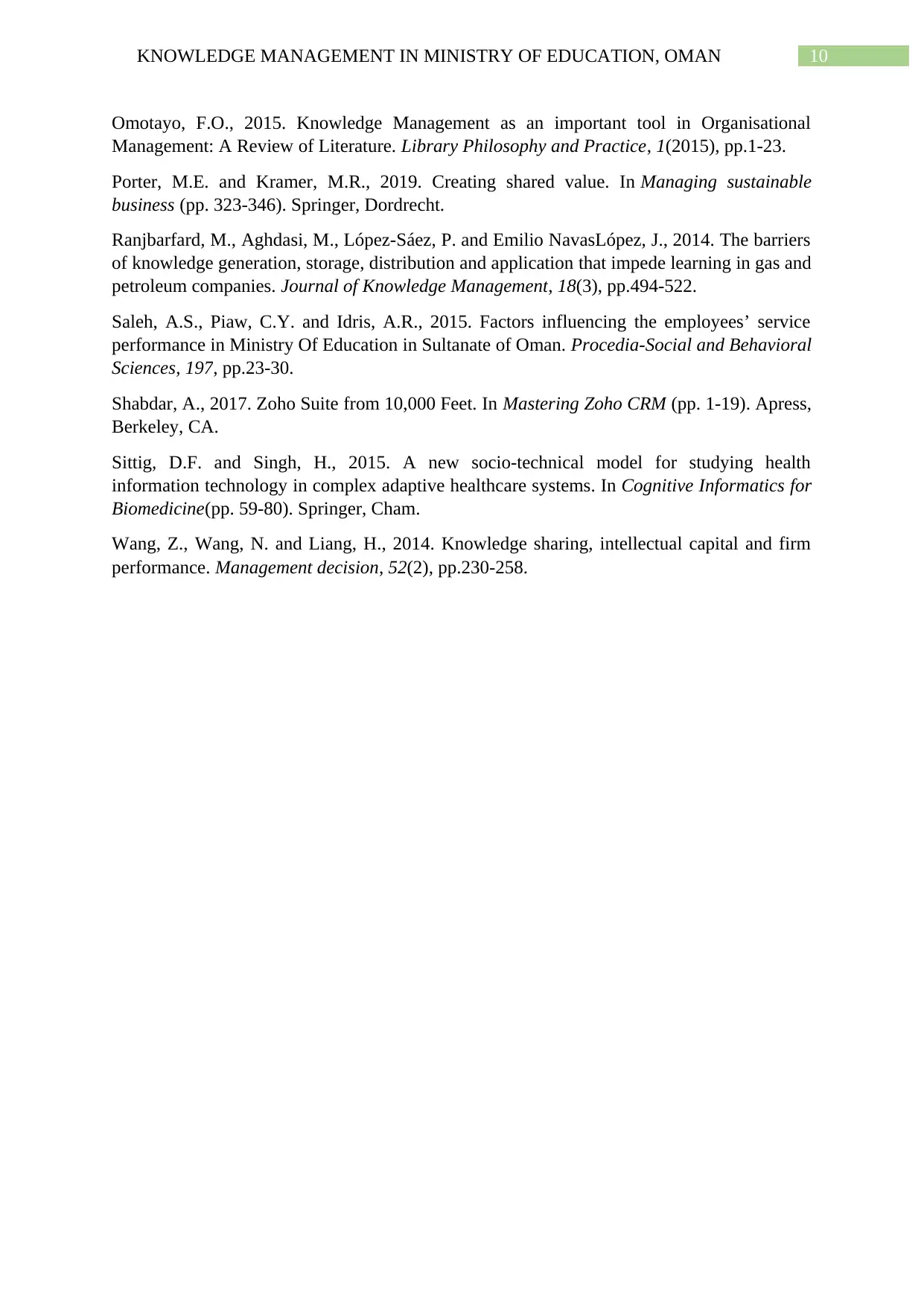
10KNOWLEDGE MANAGEMENT IN MINISTRY OF EDUCATION, OMAN
Omotayo, F.O., 2015. Knowledge Management as an important tool in Organisational
Management: A Review of Literature. Library Philosophy and Practice, 1(2015), pp.1-23.
Porter, M.E. and Kramer, M.R., 2019. Creating shared value. In Managing sustainable
business (pp. 323-346). Springer, Dordrecht.
Ranjbarfard, M., Aghdasi, M., López-Sáez, P. and Emilio NavasLópez, J., 2014. The barriers
of knowledge generation, storage, distribution and application that impede learning in gas and
petroleum companies. Journal of Knowledge Management, 18(3), pp.494-522.
Saleh, A.S., Piaw, C.Y. and Idris, A.R., 2015. Factors influencing the employees’ service
performance in Ministry Of Education in Sultanate of Oman. Procedia-Social and Behavioral
Sciences, 197, pp.23-30.
Shabdar, A., 2017. Zoho Suite from 10,000 Feet. In Mastering Zoho CRM (pp. 1-19). Apress,
Berkeley, CA.
Sittig, D.F. and Singh, H., 2015. A new socio-technical model for studying health
information technology in complex adaptive healthcare systems. In Cognitive Informatics for
Biomedicine(pp. 59-80). Springer, Cham.
Wang, Z., Wang, N. and Liang, H., 2014. Knowledge sharing, intellectual capital and firm
performance. Management decision, 52(2), pp.230-258.
Omotayo, F.O., 2015. Knowledge Management as an important tool in Organisational
Management: A Review of Literature. Library Philosophy and Practice, 1(2015), pp.1-23.
Porter, M.E. and Kramer, M.R., 2019. Creating shared value. In Managing sustainable
business (pp. 323-346). Springer, Dordrecht.
Ranjbarfard, M., Aghdasi, M., López-Sáez, P. and Emilio NavasLópez, J., 2014. The barriers
of knowledge generation, storage, distribution and application that impede learning in gas and
petroleum companies. Journal of Knowledge Management, 18(3), pp.494-522.
Saleh, A.S., Piaw, C.Y. and Idris, A.R., 2015. Factors influencing the employees’ service
performance in Ministry Of Education in Sultanate of Oman. Procedia-Social and Behavioral
Sciences, 197, pp.23-30.
Shabdar, A., 2017. Zoho Suite from 10,000 Feet. In Mastering Zoho CRM (pp. 1-19). Apress,
Berkeley, CA.
Sittig, D.F. and Singh, H., 2015. A new socio-technical model for studying health
information technology in complex adaptive healthcare systems. In Cognitive Informatics for
Biomedicine(pp. 59-80). Springer, Cham.
Wang, Z., Wang, N. and Liang, H., 2014. Knowledge sharing, intellectual capital and firm
performance. Management decision, 52(2), pp.230-258.
1 out of 11
Related Documents
Your All-in-One AI-Powered Toolkit for Academic Success.
+13062052269
info@desklib.com
Available 24*7 on WhatsApp / Email
![[object Object]](/_next/static/media/star-bottom.7253800d.svg)
Unlock your academic potential
© 2024 | Zucol Services PVT LTD | All rights reserved.





